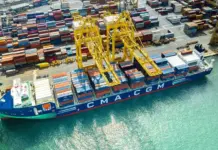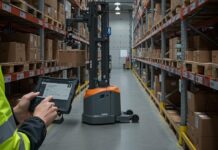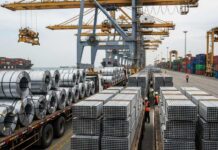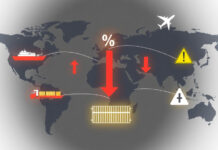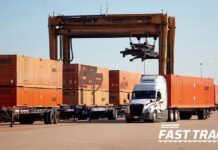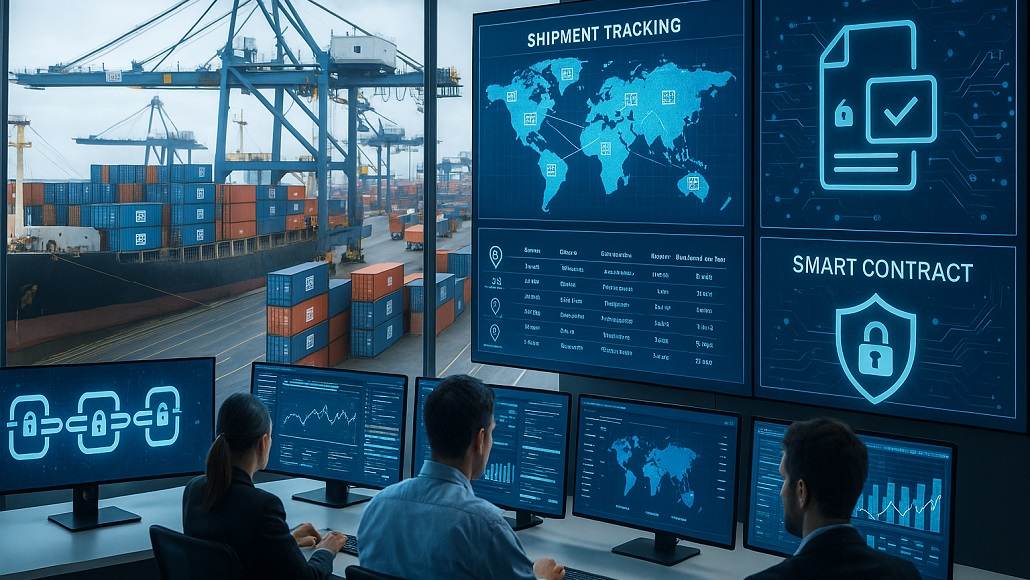The global freight industry has long been the backbone of international trade, facilitating the movement of goods across continents and connecting businesses with consumers. Despite its importance, though, it is still plagued by inefficiency, antiquated procedures, and secrecy. With the digital revolution in logistics on the upswing, blockchain technology has proven to be the game-changer to solve these issues. From ports to platforms, blockchain is revolutionising FreightTech by enhancing transparency, trust and efficiency within the supply chain.
Blockchain (essentially a decentralised ledger technology) keeps transactions safe and unchangeable.The ability to offer a single, unalterable record of events is particularly advantageous for the freight environment, where multiple parties may be involved—the shipper, the carrier, the customs agents, and the end receiver must all collaborate and verify the information within the supply chain.
The Role of Blockchain in FreightTech
Blockchain has brought a paradigm change in how data is shared and verified in logistics. Conventional freight operations have been based on isolated systems, dispersed data, and paperwork. Even as a vital segment of the world economy, the industry has continually suffered from fraud, inefficiency, and lack of visibility.
Blockchain solves these issues by providing an integrated framework for data sharing, where everyone can be assured of getting correct, real-time data.
One of the primary uses of blockchain in FreightTech is smart contracts. Self-executing contracts are used for the automation of processes like payment approval, tracking of cargo, and verification of compliance.
Applications of Blockchain from Ports to Platforms
The influence of blockchain on FreightTech reaches all aspects of the supply chain, from port functions to digital platforms. By solving inefficiencies at each level, blockchain-based solutions are transforming how products move and are handled.
- Enhancing Port Operations
Ports are the centres of international trade and gateways for products moving into or out of nations. Port inefficiencies like congestion, paperwork, and mismanagement, though, frequently cause costs to rise and shipments to be delayed. Blockchain technology solves these problems by digitalising and automating critical processes, making port operations highly efficient and clear systems.
Perhaps the most direct advantage blockchain has to offer ports is the documentation digitisation. Invoices, customs declarations, and bills of lading are normally processed via paper-based channels, clogging up the system and inviting mistakes. Blockchain replaces these with unalterable digital records that can be opened in real-time by approved parties. A blockchain solution not only speeds up the handling of documentation but also reduces fraud and tampering.
Blockchain also provides a way for different port players (shipping lines, terminal operators, freight forwarders, etc.) to collaborate openly.
Blockchain offers participants a simple mechanism to share information in a single forum, allowing for the elimination of miscommunication or shared information resulting in differing perspectives. Ports that utilise blockchain are in a stronger position to cement their operation in the face of increasing trade and to continue to operate business as usual.
- Revolutionizing Carrier and Fleet Operations
The shipping of commodities over long distances entails multiple fleets and carriers, each with associated logistics. Blockchain transforms carrier and fleet operations by embedding transparency, automation, and efficiency into the process, ultimately enhancing service dependability and lowering operational expenses.
Real-time fleet tracking is one of the most impressive uses of blockchain in carrier operations. Through interfacing with Internet of Things (IoT) devices mounted on vehicles, blockchain can record location data, speed, fuel usage, and delivery times. The data is stored on an immutable ledger such that it is tamper-proof yet available to stakeholders who need to see it. Fleet managers have access to this information to forecast delays, plan routes, and enhance the use of the fleet overall.
Blockchain can also enhance the payment process for carriers. Late payment is a common problem in the logistics environment, typically caused by disagreement or administration errors. Smart contracts that employ blockchain can eliminate this problem by simplifying the payment process. Payments are automatically processed when defined requirements, such as proof of delivery, are met and confirmed on the blockchain. This simply reduces payment times and builds trust with shippers and carriers.
- Connecting Digital Freight Platforms
Digital freight platforms have emerged as important coordination centres for logistics operations, connecting shippers, carriers, and brokers. Blockchain technology enhances these platforms by creating secure transactions, real-time information sharing, and visibility, which provide a more reliable and efficient network.
One of the major benefits of using blockchain on freight platforms is that it can authenticate and verify transactions. Freight contracts, prices, and delivery dates can be put on the blockchain so that all involved parties are working from a single version of the truth. This reduces the likelihood of conflicts and, thereby, helps to establish trust among platform users.
- Securing Cold Chain Logistics
Cold chain logistics refers to the transportation of temperature-sensitive commodities such as pharmaceuticals and fresh produce, and careful monitoring and control are necessary in marketplaces. Blockchain technology can improve the efficiency and dependability of cold chain logistics when it is used in combination with IoT sensors with transparent, tamper-proof records of environments in transit.
By using containers with IoT capabilities, variables such as temperature, humidity, and vibration can be tracked in real-time. Blockchain allows for end Airports and terminals to now incorporate real-time sensors for the benefits of both cold chain logistics providers and customers.
Blockchain creates an immutable and tamper-proof record of conditions, while IoT allows conditions to be monitored in real time and provides alerts if conditions egregiously deviate or err from pre-set conditions communicated to, and accepted by, the logistics partner.
- Improving Trade Finance and Compliance
Trade finance, the underpinning of international trade, is often a convoluted process involving a plethora of intermediaries. Blockchain simplifies and secures these processes, allowing for quicker, transparent trade finance transactions.
Blockchain also enables automatic payment execution under financial arrangements with smart contracts. As blockchain creates an auditable record of financial and trade documents, it also improves compliance. Customs declarations, export licences, and letters of credit are safely stored on the blockchain, meaning they can neither be faked nor misplaced. This results in a more effective decision-making process when processing clearance through customs and reduces delays.
- Optimizing Inventory Management and Warehousing
Proper inventory management is essential to reduce costs and deliver customer demand. Blockchain streamlines inventory operations by offering a secure and real-time record of stock levels throughout the supply chain.
By tracing inventory movements on the blockchain, companies are able to follow stock through manufacturing and distribution. This makes manual errors obsolete and guarantees inventory information to be accurate and real-time. Blockchain also improves warehousing by being able to support shared storage frameworks. Several firms can collaborate and share warehousing space and see inventory information securely on the blockchain, lowering overheads.
- Supporting Reverse Logistics
Reverse logistics is the return, recycling, or disposal of products and is frequently riddled with inefficiencies. Blockchain facilitates reverse logistics by providing traceability and accountability for the entire product life cycle.
Blockchain can capture information regarding the origin, ownership, and condition of a product, facilitating smooth returns. It also streamlines recycling by tracing materials and making sure they are disposed of or recycled according to environmental regulations.
- Improving Last-Mile Delivery
Last-mile delivery, the last phase of logistics, is usually the most complicated and expensive. Blockchain increases last-mile logistics by facilitating better coordination and accountability for all stakeholders.
Blockchain-enabled systems make it possible to monitor shipments in real time, so customers are always aware of the status of their shipments. Payments can be processed automatically through smart contracts, releasing funds to couriers when they deliver. This not only guarantees efficiency but also fosters trust between customers and providers.
- Enabling Corporate Sustainability Objectives
Sustainability has become the central focus of corporations worldwide. Blockchain aids in these efforts by documenting the environmental data, including carbon emissions and fuel consumption.
Blockchain enables the tracing of sustainable materials and processes through the supply chain. Companies can utilise blockchain to provide proof of ethics responding to working conditions and verified appropriate environmental organisational rules of conduct with suppliers. This level of visibility improves a company’s reputation and meets consumers’ expectations of sustainable business.
- Increasing Collaboration Among Stakeholders
Logistics is a business that relies on many stakeholders working together, including carriers, shippers, customs officials, and warehouse workers – often too many different stakeholders. Blockchain simplifies this collaboration because it creates a standard platform for the exchange of data and communication.
Blockchain allows everyone to access the same, real-time, trustworthy data by breaking down the silos, which reduces miscommunication, allows better judgement, and lets everyone follow the same goals together. The outcome is a more resilient and efficient supply chain ecosystem.
Conclusion
Blockchain in FreightTech industry is a game-changer; there are groundbreaking blockchain solutions for every aspect of the shipping process from the port to the platform. By increasing transparency in the process, as well as efficiency and security, blockchain is tackling age-old problems in freight and creating new pathways for growth and innovation.
As blockchain development accelerates, its combination with other digital technologies will continue to expand its reach, ushering in a new age of smart, connected, and sustainable logistics. Although there are challenges ahead, the collaborative work of industry players will bring about a future where blockchain is one of the pillars of global freight operations.


